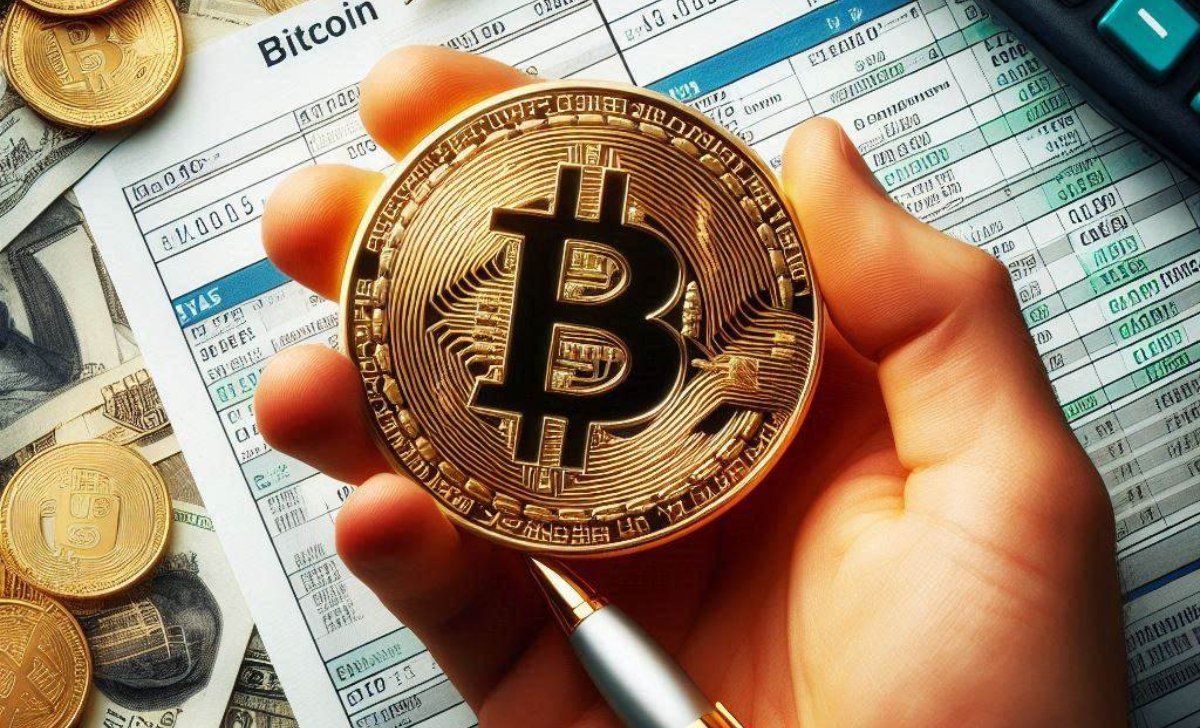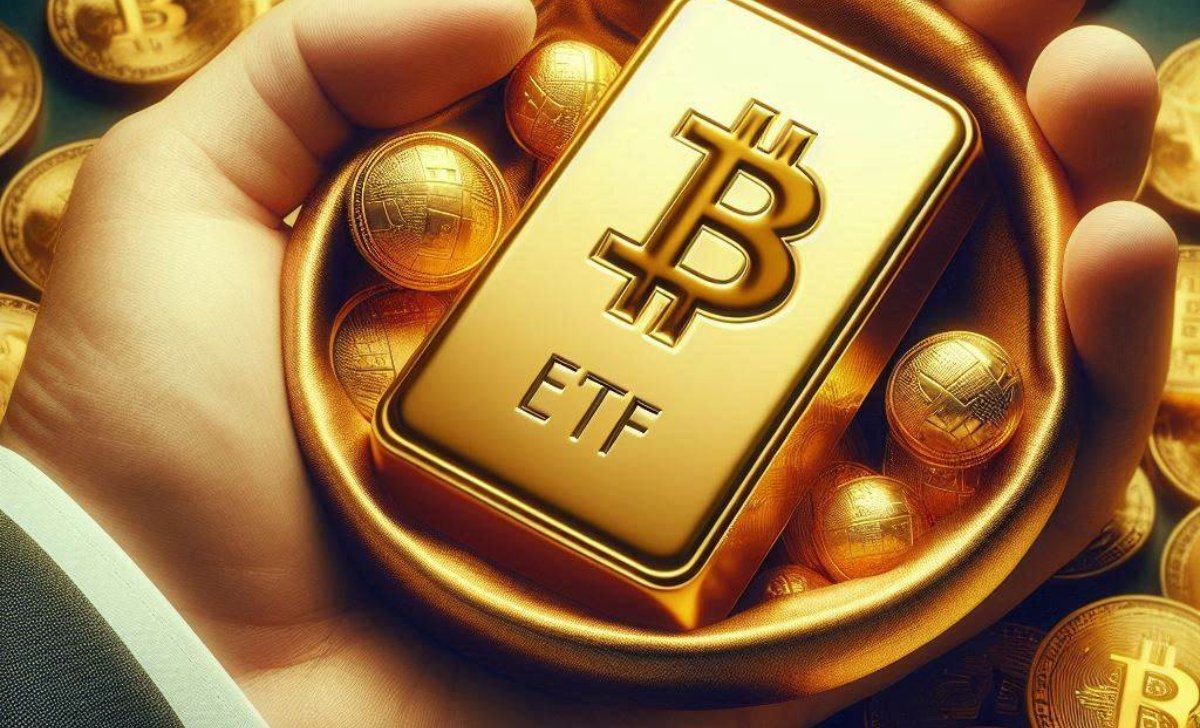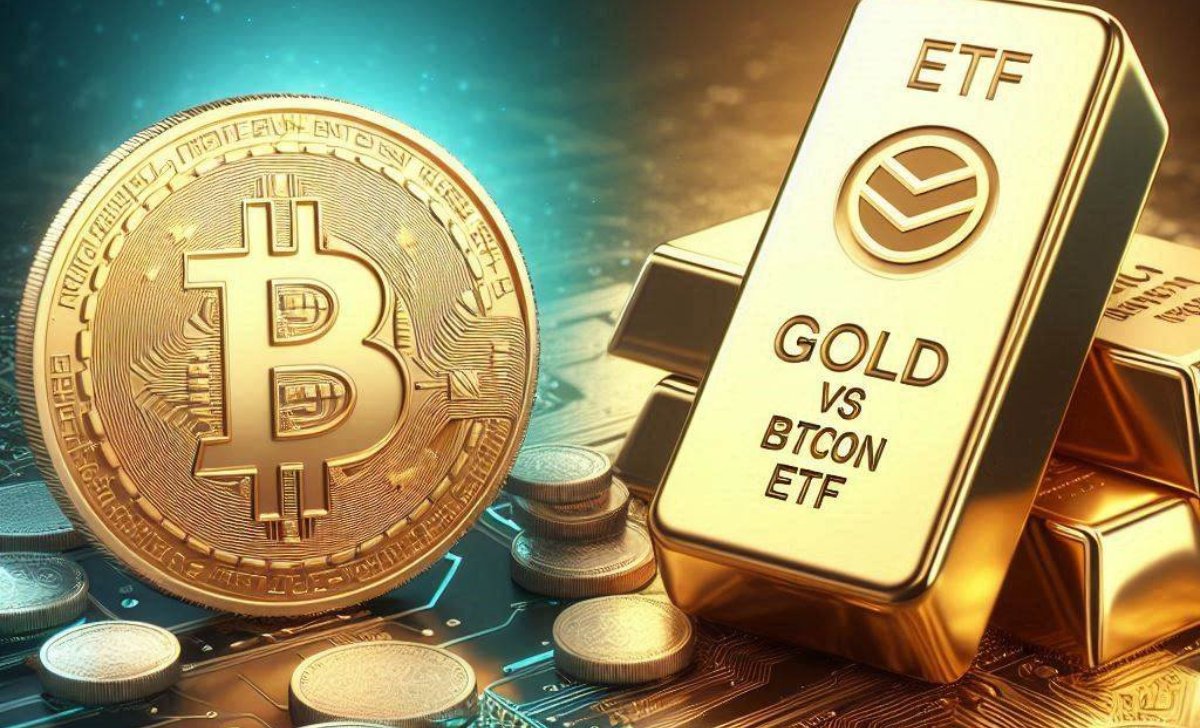Bitcoin ETF vs Gold ETF are two popular investment options, each offering unique benefits and risks. While Bitcoin ETFs provide exposure to the fast-growing cryptocurrency market, Gold ETFs have long been a trusted hedge against economic uncertainty.
In this article, TopCoin9 will help you gain a better understanding of their definitions, comparisons, pros and cons, and which one is the better investment choice!
What are Bitcoin ETFs?

A Bitcoin ETF (Exchange-Traded Fund) is a financial product that allows investors to gain exposure to Bitcoin without directly holding cryptocurrency. These ETFs track the price of Bitcoin and trade on traditional stock exchanges, just like stocks.
How Bitcoin ETFs Work
Bitcoin ETFs come in two main types:
- Spot Bitcoin ETFs: These funds hold actual Bitcoin, meaning their value directly reflects the price of Bitcoin in real-time.
- Futures Bitcoin ETFs: These ETFs do not hold Bitcoin but instead invest in Bitcoin futures contracts, tracking Bitcoin’s expected future price rather than its spot price.
Benefits of Bitcoin ETFs
- Regulated and accessible: Unlike buying Bitcoin directly, Bitcoin ETFs operate within regulated financial markets, making them more accessible to traditional investors.
- No need for private keys or wallets: Investors don’t have to worry about securing private keys or managing a cryptocurrency wallet.
- Liquidity and ease of trading: They can be traded like stocks, making them convenient for short-term and long-term investment strategies.
Now that we have a clear understanding of Bitcoin ETFs, let’s take a closer look at their traditional counterpart, Gold ETFs.
When Bitcoin ETFs are compared to gold, it stands out as a time-tested investment, offering stability and a proven track record over decades. Let’s explore that in the next section!
What are Gold ETFs?

A Gold ETF is an exchange-traded fund that tracks the price of gold. Unlike Bitcoin ETFs, which are relatively new, Gold ETFs have been around since the early 2000s, offering investors an easy way to invest in gold without owning physical bullion.
How Gold ETFs Work
Gold ETFs are backed by physical gold or gold-related derivatives, ensuring that their value is directly tied to the price of gold. Investors buy shares in a Gold ETF, and each share represents a portion of the total gold holdings. Similarly, the rise of Bitcoin ETFs is shaping market dynamics, and the Bitcoin ETF impact on crypto could drive greater institutional adoption and price stability.
Benefits of Gold ETFs
- Stability and reliability: Gold has been a store of value for centuries, making it a low-risk investment.
- Hedge against inflation: Gold is often seen as a safeguard during economic downturns and market volatility.
- Easier than physical gold: No need to store, secure or insure gold bars, everything is managed through a brokerage account.
Both Bitcoin ETF vs Gold ETF provide a way to invest in valuable assets, but how do they compare when analyzed side by side? Let’s examine their key differences in the following content.
Bitcoin ETF vs Gold ETF: Key Differences

When comparing Bitcoin ETF vs Gold ETF, several important factors come into play.
Volatility & Risk
- Bitcoin ETFs: Bitcoin is known for its extreme price fluctuations, often experiencing swings of 10-20% within a few days. While this volatility presents opportunities for high returns, it also carries the risk of substantial losses. Investors in Bitcoin ETFs should be prepared for market turbulence.
- Gold ETFs: Gold is historically recognized as a stable and low-risk investment. Its price movements are relatively gradual, making Gold ETFs a safer option for investors who prefer stability over rapid gains.
Performance & Returns
- Bitcoin ETFs: Over the past decade, Bitcoin has significantly outperformed most traditional assets, including gold, delivering exceptional returns for early investors. However, the cryptocurrency market is still evolving, and past performance does not guarantee future success.
- Gold ETFs: Gold has shown steady and reliable appreciation over time, making it a dependable store of value. However, compared to Bitcoin, the returns on Gold ETFs tend to be more modest and gradual.
Inflation Hedge
- Bitcoin ETFs: Bitcoin is often referred to as “digital gold” due to its fixed supply of 21 million coins, making it resistant to inflation. However, since Bitcoin has only existed since 2009, there is still uncertainty about its long-term effectiveness as an inflation hedge.
- Gold ETFs: Gold has a proven track record of maintaining value during periods of economic instability and inflation. Historically, when fiat currencies weaken, gold tends to increase in value, making it a reliable choice for protecting purchasing power.
Accessibility & Regulation
- Bitcoin ETFs: Bitcoin ETFs are a relatively new financial product, and regulatory uncertainties still surround them. Different countries have varying rules on Bitcoin ETF approvals, and changes in regulations could impact their performance.
- Gold ETFs: Gold ETFs are well-established and widely accepted in global financial markets. They operate under clear regulatory frameworks, making them a trusted and secure investment option for institutional and retail investors alike.
Now that we’ve compared their differences, let’s weigh the pros and cons of Bitcoin ETF vs Gold ETF before making an investment decision.
Pros and Cons of Bitcoin ETFs

Pros
- Provide exposure to Bitcoin’s price movements without the need to buy, store, or secure cryptocurrency.
- Traded on traditional stock exchanges, making them accessible to both retail and institutional investors.
- Operate under regulated financial frameworks, offering a level of protection and compliance not available in direct crypto investments.
- Increasing institutional adoption, with major funds like iShares Bitcoin Trust managing large assets, boosting credibility.
- Enable investors to diversify into the crypto market without handling digital wallets or private keys.
- Bitcoin’s strong historical performance has attracted investors looking for potential high returns.
Cons
- Prices are directly tied to Bitcoin ETFs’ volatility, leading to potential significant losses in short periods.
- ETF performance may differ from direct Bitcoin ownership due to factors like tracking errors and fund management fees.
- Some traditional investors may find cryptocurrency’s speculative nature and complex market dynamics challenging.
- Being a new financial product, Bitcoin ETFs lack a long-term track record, making future performance uncertain compared to established assets like gold.
- Ongoing management fees can gradually reduce overall returns over time.
- Vulnerable to market risks such as regulatory changes, liquidity issues, and potential price manipulation within the broader crypto ecosystem.
While Bitcoin ETFs offer exciting opportunities, Gold ETFs remain a tried-and-true investment option. Let’s explore their pros and cons next!
Pros and Cons of Gold ETFs

Pros
- Effective hedge against inflation, helping to maintain purchasing power during periods of economic uncertainty.
- Eliminates the need for physical storage, providing a simple and secure way to invest in gold without handling bullion.
- Highly liquid, as shares can be bought and sold on stock exchanges, just like traditional equities.
- Enhances portfolio stability, especially when combined with high-volatility investments.
- Widely regarded as a safe-haven asset, making it an attractive option for risk-averse investors.
- Less price volatility compared to assets like cryptocurrencies or speculative stocks, offering more predictable value retention.
Cons
- Management and storage costs associated with physically-backed Gold ETFs can gradually diminish returns.
- Futures-based Gold ETFs may not always track gold prices accurately, leading to potential tracking discrepancies.
- Converting ETF shares into physical gold may involve additional fees and liquidity limitations, making immediate access to the asset less convenient.
- Historically, lower returns compared to high-growth investments, such as Bitcoin or tech stocks.
- Gold prices are influenced by global events and economic conditions, which can sometimes cause unexpected fluctuations.
- Does not generate passive income, as gold does not pay dividends or interest, unlike stocks or bonds.
Given these factors, which ETF is the better investment option? Let’s analyze which type of investor each is suited for in the next section!
Which ETF is Better for Investors?
The choice between Bitcoin ETF vs Gold ETF depends on your investment goals, risk tolerance, and market outlook.
- Choose Bitcoin ETFs if:
- You are a risk-tolerant investor seeking high-growth potential.
- You believe in the long-term adoption of Bitcoin as a financial asset.
- You are comfortable with price volatility.
- Choose Gold ETFs if:
- You prefer stability and security over high returns.
- You want to hedge against inflation and economic downturns.
- You are looking for a long-term, low-risk investment.
Bitcoin ETF vs Gold ETF each cater to different investment strategies, Bitcoin ETFs offer high growth potential, while Gold ETFs provide stability and inflation protection. Choosing the right one depends on your financial goals and risk tolerance. Hopefully, this article has given you valuable insights to make a well-informed investment decision!

Emily Thompson is a highly skilled crypto writer and strategist with extensive experience in blockchain journalism, having contributed to Cointelegraph and Binance Academy. At TopCoin9, she ensures high-quality, SEO-optimized content that educates and informs the crypto community.
Email: [email protected]












